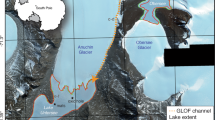Abstract
THE Volta Dam was closed on May 18, 1964, initiating the transformation of a tropical river into one of the largest man-made lakes in the world. This lake will lie between latitudes 6° N. and 9° N. along the 0° meridian. Stretching more than 250 miles, it will eventually cover an area of 3,275 square miles and hold 120 million ft./acre of water. The maximum elevation of the water surface will be maintained at 276 ft. above sea-level and the seasonal variation in depth will be 8–10 ft.
This is a preview of subscription content, access via your institution
Access options
Subscribe to this journal
Receive 51 print issues and online access
$199.00 per year
only $3.90 per issue
Buy this article
- Purchase on Springer Link
- Instant access to full article PDF
Prices may be subject to local taxes which are calculated during checkout
Similar content being viewed by others
References
Lawson, G. W., Nature, 199, 858 (1963).
Truesdale, G. A., Downing, A. L., and Lowden, G. F., J. Appl. Chem., 5, 53, 502 (1955).
Welch, P. S., Limnology (McGraw-Hill Book Company Inc., New York, 1952).
Harding, D., Nature, 191, 119 (1961).
Author information
Authors and Affiliations
Rights and permissions
About this article
Cite this article
BISWAS, S. Oxygen and Phytoplankton Changes in the Newly Forming Volta Lake in Ghana. Nature 209, 218–219 (1966). https://doi.org/10.1038/209218a0
Issue Date:
DOI: https://doi.org/10.1038/209218a0
This article is cited by
-
Water quality and plankton periodicity in two contrasting mine lakes in Jos, Nigeria
Hydrobiologia (1990)
-
The seasonality of phytoplankton in African lakes
Hydrobiologia (1986)
-
Some ecological consequences of a projected deep reservoir in the Kabalebo River in Suriname
Hydrobiological Bulletin (1982)
-
Periphyton in the Volta Lake. I. Seasonal changes on the trunks of flooded trees
Hydrobiologia (1981)
-
Environmental factors affecting the seasonal changes of net plankton in two tropical fish ponds in India
Schweizerische Zeitschrift für Hydrologie (1980)
Comments
By submitting a comment you agree to abide by our Terms and Community Guidelines. If you find something abusive or that does not comply with our terms or guidelines please flag it as inappropriate.



